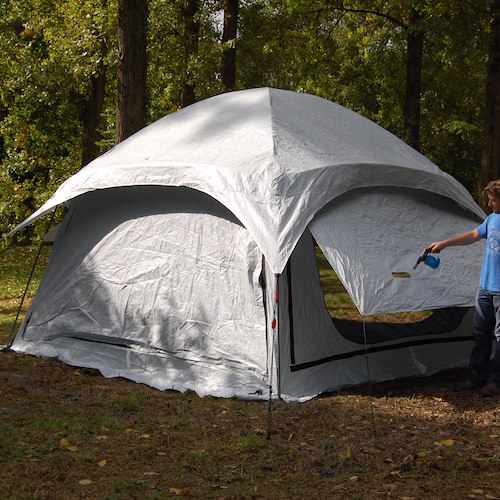Fires In Humanitarian Contexts: Minimising the Risks
On Tuesday 8th September, fires broke out in Europe’s largest refugee camp in Moria on the Greek island of Lesbos. A fast-moving fire destroyed almost the entire camp, leaving most of its 12,000 residents homeless. Only a medical facility and small clusters of tents remained untouched.
Reducing the Risks
In humanitarian contexts, the combination of densely assembled shelters with open heat & flame sources can – and all too frequently do – lead to catastrophic consequences for those living in camps for IDPs.
As designer and supplier of tents and relief items, we cannot remove the risk of fire nor eliminate the environmental contexts in which they arise. However, by developing and supplying shelters that are slow flame spread and/or fire retardant treated, we can help minimise the spread of fires in humanitarian contexts, reducing the potentially severe human and material impact.
Development and testing
Research on product safety, and in particular fire safety, has always been a product development priority at Alpinter. All of our latest range of Family Tents and Multipurpose Shelters are using fire resistant CPAI 84-6 material or slow flame spread material, guaranteeing the safety of those occupying the tents, and in the immediate surroundings.
To evaluate the fire resistance of our products, we perform real-life and lab tests, following internationally recognised testing methods.
Fire Testing In Action
We filmed this real-world test in 2015, comparing the fire resistance of 2 polycotton family tents: one with FR Chemical Treatment, and one without:
Likewise, the real-world capabilities of family tents fabricated from slow flame spread PE have also been tested, demonstrating their efficacy without the need for additional chemical treatments.
Video created by ICRC – IFRC R&D project
This footage highlights the significant difference in time for the occupants of the tent to respond to a fire emergency, and the importance of considering fire resistance and slow flame spread in products deployed in humanitarian operations.
For more information on our products, the fire testing we perform or stock availabilities, please contact us.
